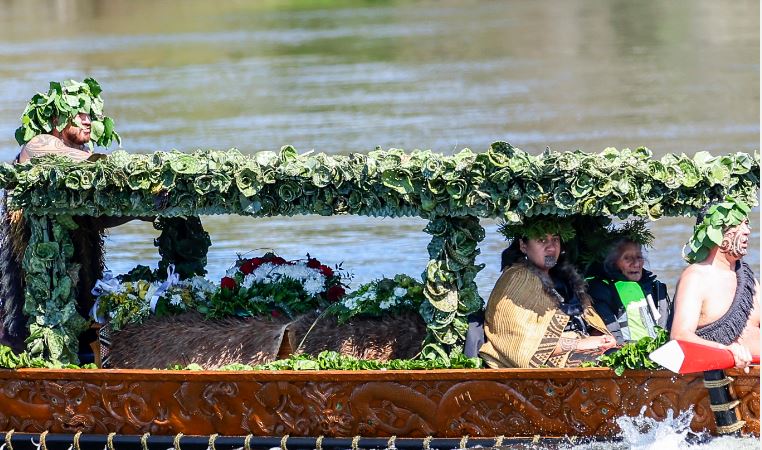Hamilton/New Zealand: The Māori people of New Zealand, the indigenous population of the country, have crowned a new monarch following the passing of their king. The newly crowned queen, Nga Wai Hono i te Po Paki, holds a unique distinction—she is Catholic, marking a profound intersection of Māori tradition and Christian faith that has significant implications for the Kingitanga movement, as reported by The Guardian. Photo Credits: The Guardian
King Tuheitia Potatau Te Wherowhero VII, who served as the leader of the Kingitanga movement, passed away on August 30, 2024, at the age of 69. His death came just days after celebrating his 18th anniversary as king. The Kingitanga, or Māori King Movement, was established in 1858 to unite the Māori under a single sovereign, and it stands as one of the longest-running political organizations in New Zealand.
At 27 years old, Nga Wai Hono i te Po Paki, the late king’s youngest daughter, was named his successor. Her first appearance as queen took place on September 5, when she took her place on the throne near her father’s coffin. The ceremony, known as Te Whakawahinga (raising up), was held in the small town of Ngāruawāhia. The Kiingitanga advisory council, comprising 12 elders from various tribes, chose her as their queen, following the traditions of their ancestors.

Queen Ngawai Hono ki Parakino’s Catholic faith is deeply rooted in her family history and is emblematic of the long-standing relationship between the Kingitanga movement and the Catholic Church. Her grandmother, Queen Te Arikinui Dame Te Atairangikaahu, played a crucial role in strengthening this bond by ensuring that her granddaughter was baptized by the late Auxiliary Bishop Max Takuira Matthew Mariu, the first Māori Catholic bishop. This act of baptism was not merely a religious rite but also a symbolic gesture intended to unite the Māori tribes under the dual pillars of their traditional leadership and Christian faith.
Queen Ngawai Hono ki Parakino, which translates to “Joining of the Rivers,” embodies this unity between the Kingitanga and the Catholic Church. Her faith is not just a personal conviction but a bridge that connects two worlds—Māori spirituality and Catholicism. Throughout her life, she has been actively involved in the Catholic community, often participating in church events, and advocating for the values of peace, social justice, and the protection of Māori culture within the broader Christian context.
As the eighth monarch in the Māori royal lineage, Queen Ngawai Hono ki Parakino is directly descended from the first Māori king. At her coronation, she was anointed with sacred oils and blessed with the Bible used to crown the first Māori king in 1858. Her role, while largely ceremonial, also positions her as the paramount chief of several Māori tribes.
Queen Ngawai Hono i te Po Paki holds a master's degree in Māori cultural studies from Waikato University and received her moko kauae (chin tattoo) at the age of 19 as a gift to her father for his years of service on the throne. As the second-youngest monarch in Māori history, she has been a prominent figure alongside her father at many significant events, making her crown an emotional and joyous occasion for many.
Annette Sykes, a prominent lawyer who has long fought for Māori rights, expressed hope for the new queen’s leadership. “She’s inspiring, representing the revitalization of our language and culture. She embodies the future we’ve been working towards. Her first language is Māori, and she speaks it with ease. She is political, economic, and social well-being for our people, much like her grandmother, who was adored by the nation.”